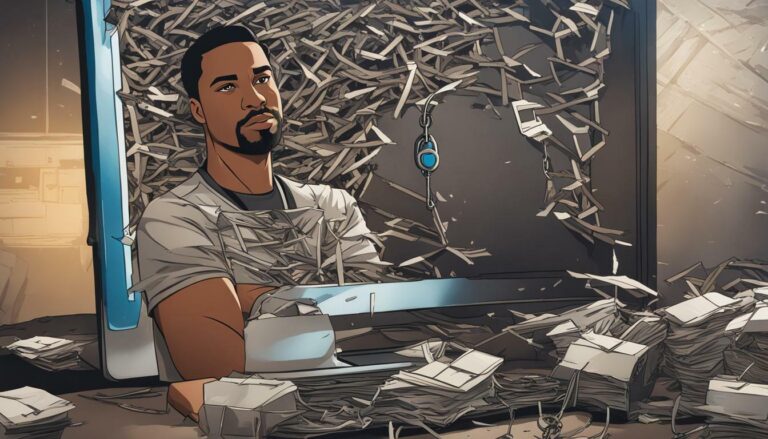How to Remove Settled Accounts from a Credit Report Explained

Understanding how to remove settled accounts from your credit report is crucial for improving your credit score and financial health. Settled accounts can remain on your credit report for up to 7 years, negatively impacting your credit score. However, it’s important to note that leaving a settled account untouched can actually help improve your credit history if it has no direct effect on your score. If you do wish to remove settled accounts, there are several strategies you can try.

Key Takeaways:
- Disputing inaccurate settled accounts with the credit bureau is a potential option for removal.
- Sending a goodwill letter to the lender can be an effective way to request removal of settled accounts.
- Waiting for settled accounts to naturally drop off your credit report after 7 years is another option.
- Debt settlement can have a negative impact on your credit, but it is often a better choice than leaving the debt unpaid or going through bankruptcy.
- Exploring additional strategies for credit repair and improvement can also contribute to a better financial future.
The Impact of Settled Accounts on Your Credit Report
Settled accounts can have a negative impact on your credit report and potentially lower your credit score, making it important to understand their implications. When an account is marked as settled, it means that you have reached an agreement with the creditor to pay off a debt for less than the full amount owed. While this may seem like a positive resolution, it can still have consequences for your creditworthiness.
One of the main ways settled accounts can affect your credit report is by lowering your credit score. When a creditor reports an account as settled, it indicates that you were unable to fulfill the original repayment terms. This can be seen as a negative mark on your credit history and may cause your credit score to drop. A lower credit score can make it more difficult for you to qualify for loans, credit cards, or favorable interest rates in the future.
Additionally, settled accounts can remain on your credit report for up to 7 years, even after they have been paid off. During this time, they may be viewed as a red flag by potential lenders or creditors, as they indicate past financial difficulties. These negative marks can hinder your chances of obtaining credit or may result in higher interest rates and less favorable terms.
| Key Points: | Implications: |
|---|---|
| Settled accounts lower your credit score | May make it harder to qualify for credit |
| Settled accounts remain on your credit report for up to 7 years | Potential lenders may view them as a risk |
| May result in higher interest rates and less favorable terms | Financial difficulties may impact future credit opportunities |
It’s important to note, however, that if the settled account has no direct effect on your credit score, it may be best to leave it alone. In some cases, having a settled account on your credit history can demonstrate that you took responsibility for your debts and eventually resolved them. This can actually work in your favor by showing lenders that you have made efforts to improve your financial situation.
🚨 TUIC Errors + Low Credit Score?
CreditScoreIQ helps you build credit faster by reporting utility bills to all 3 bureaus—while you dispute errors.
Start Building Credit Today →Understanding the impact of settled accounts on your credit report is crucial for making informed decisions about managing your credit and improving your credit score. By being aware of these implications, you can take steps to minimize the negative effects and work towards a stronger financial future.
>> Use Your Utility Bill to Help With Your Credit Score – See How Here <<
Disputing Inaccurate Settled Accounts with the Credit Bureau
If you believe there are inaccuracies in your settled accounts, you can dispute them with the credit bureau for potential removal. It’s important to take action because inaccurate information on your credit report can have a negative impact on your credit score and financial standing. Here’s how you can go about disputing settled accounts and improving your credit report:
- Gather supporting documents: Before disputing the settled accounts, collect any relevant evidence that proves the inaccuracy. This could include payment receipts, letters from the creditor, or any other supporting documentation.
- Write a formal dispute letter: Craft a detailed letter to the credit bureau explaining the inaccuracies in the settled accounts. Clearly state the errors and attach the supporting documents you’ve gathered. Be sure to include your personal information, such as your full name, address, and social security number, as well as the account numbers and the reasons for disputing.
- Send the letter via certified mail: It’s crucial to send your dispute letter via certified mail with a return receipt requested. This way, you’ll have proof that the credit bureau received your letter and can track its delivery.
If the credit bureau finds your dispute valid, they will investigate the settled accounts and work towards removing any inaccurate information from your credit report. Keep in mind that the process may take some time, and you may need to follow up with the credit bureau to ensure that your dispute is being properly processed.
Table: Sample Dispute Letter Format
| Date: | [Insert Date] |
|---|---|
| Your Name: | [Insert Your Name] |
| Your Address: | [Insert Your Address] |
| Credit Bureau’s Name: | [Insert Credit Bureau’s Name] |
| Credit Bureau’s Address: | [Insert Credit Bureau’s Address] |
| Subject: | Dispute of Settled Accounts on Credit Report |
Dear [Credit Bureau’s Name],
I am writing to dispute the accuracy of the settled accounts listed on my credit report. After reviewing my credit history, I have identified several inaccuracies that require immediate attention. Please find the details of the accounts and the reasons for disputing below:
Account Number Reason for Dispute [Insert Account Number] [Insert Reason for Dispute] I have attached the necessary supporting documents, including payment receipts and correspondence with the creditors, to validate my dispute. I kindly request that you investigate these settled accounts and remove any inaccurate information from my credit report. This will help me improve my credit score and financial standing.
Please notify me in writing of the outcome of your investigation within the timeframe specified by law. I appreciate your prompt attention to this matter and your assistance in resolving these inaccuracies.
Thank you for your cooperation.
Sincerely,
[Your Name]
By following these steps and providing compelling evidence, you increase your chances of successfully disputing inaccuracies in your settled accounts and ultimately improving your credit report. Remember to maintain regular communication with the credit bureau and stay persistent in your efforts to resolve any disputed information on your credit history.
Sending a Goodwill Letter to Remove Settled Accounts
A goodwill letter can be a powerful tool in requesting the removal of settled accounts from your credit history, and we’ll show you how to write one. When a debt has been settled, it’s possible that the account is still listed on your credit report, which can negatively impact your credit score. However, by sending a goodwill letter to the lender, you can explain your circumstances and ask them to remove the settled account from your credit history.
Writing a goodwill letter requires a thoughtful approach. Start by expressing your gratitude for the lender’s assistance in settling the debt and acknowledge your responsibility for the past financial obligations. Then, explain any extenuating circumstances that may have contributed to the account being settled, such as a medical emergency or temporary unemployment. It’s important to take full responsibility for your actions while emphasizing your commitment to rebuilding your credit and maintaining a positive financial future.
When crafting your goodwill letter, it’s crucial to be concise and professional. Use clear and polite language, avoiding any confrontational or accusatory tones. You may also consider including any supporting documentation, such as proof of improved financial stability or positive payment history with other accounts. This can strengthen your case and show the lender that you are determined to rectify any past financial mistakes.
| Key Points: |
|---|
| Express gratitude and acknowledge responsibility |
| Explain extenuating circumstances and commitment to financial responsibility |
| Be concise, professional, and avoid confrontational language |
| Consider including supporting documentation |
Remember, the decision to remove the settled account from your credit history is at the lender’s discretion. While a goodwill letter may not always guarantee success, it shows your proactive approach to credit repair and can establish a positive relationship with the lender. Stay patient and continue to monitor your credit report regularly.
Waiting for Settled Accounts to Drop Off Your Credit Report
Sometimes, the best course of action is to be patient and wait for settled accounts to be automatically removed from your credit report after a certain period. Settled accounts can have a negative impact on your credit score, but they will naturally drop off your report after 7 years. This means that if you have settled an account and it has been more than 7 years since the date of settlement, you may not need to take any further action to have it removed from your report.
During this waiting period, it’s important to manage your credit wisely. Even though the settled account will eventually be removed, it’s still crucial to maintain good financial habits to improve your credit score and overall financial health. This includes making all payments on time, keeping your credit utilization low, and avoiding any new negative marks on your report.
While waiting for settled accounts to drop off your credit report, you can take advantage of the opportunity to build positive credit history. Focus on paying all your bills on time, including credit cards, utilities, and loans. This will help establish a track record of responsible financial behavior, which can offset the impact of any negative marks on your report.
| Key Takeaways: |
|---|
| – Settled accounts can remain on your credit report for up to 7 years. |
| – Being patient and waiting for settled accounts to naturally drop off your report can be a viable strategy. |
| – Use this waiting period to focus on maintaining good financial habits and building positive credit history. |
By practicing responsible credit management and waiting for settled accounts to be automatically removed, you can gradually improve your credit score and financial standing. Remember, every positive action you take today contributes to a stronger credit history and a brighter financial future.
The Negative Impact of Debt Settlement on Your Credit
While settling a debt may have a negative impact on your credit, it is often a more favorable alternative to leaving the debt unpaid or resorting to bankruptcy. Debt settlement occurs when you negotiate with your creditor to pay off a portion of the outstanding balance in exchange for the remaining debt being forgiven. This can result in a lower credit score initially, but it can also provide an opportunity to regain financial stability.
When a debt is settled, it is typically reported on your credit report as “settled” or “settled for less than the full amount.” This notation can be seen by lenders and may raise concerns about your ability to manage credit responsibly. As a result, your credit score may drop temporarily. However, as time passes and you continue to make responsible financial choices, the negative impact of the settled account can diminish.
It’s important to note that while settling a debt can have consequences, it is generally a better option than leaving the debt unpaid or going through bankruptcy. Unpaid debts can lead to collections efforts, which can further damage your credit. Bankruptcy, while it may provide temporary relief, can have long-term repercussions on your creditworthiness and ability to secure future loans or credit.
Ultimately, the decision to settle a debt should be based on your unique financial situation and goals. It’s important to weigh the potential negative impact on your credit against the benefits of resolving the debt and moving towards financial stability. Consulting with a reputable credit counseling agency or financial advisor can help you make an informed decision and guide you through the debt settlement process.
| Pros of Debt Settlement | Cons of Debt Settlement |
|---|---|
| Opportunity to reduce the overall debt amount | Temporary drop in credit score |
| Ability to regain financial stability | Notation of “settled” on your credit report |
| Potential for debt forgiveness | Concerns raised by lenders about creditworthiness |
Expert Tip:
“While debt settlement may have a negative impact on your credit in the short term, it can provide an opportunity for you to get back on track financially. If you decide to pursue debt settlement, make sure you fully understand the potential consequences and develop a plan to rebuild your credit over time.”
Other Strategies for Credit Repair and Improvement
Removing settled accounts is just one step in the journey to improving your credit, and in this section, we’ll offer further strategies for credit repair and overall financial well-being.
1. Establish positive credit history: One effective way to improve your credit is to establish a track record of responsible credit usage. Consider opening a secured credit card or becoming an authorized user on someone else’s credit card, ensuring that the account is in good standing and has a low utilization rate. Use these accounts responsibly by making small purchases and paying off the balance in full and on time each month.
2. Monitor your credit regularly: Stay vigilant about monitoring your credit report to catch any errors or inaccuracies. You can request a free copy of your credit report from each of the three major credit bureaus once a year. Look for any negative items that may be outdated or incorrect and dispute them as necessary.
| Resource | Website |
|---|---|
| Equifax | www.equifax.com |
| Experian | www.experian.com |
| TransUnion | www.transunion.com |
3. Manage your debts wisely: Paying off your debts in a timely manner can greatly improve your credit score. If you have multiple debts, consider using the snowball or avalanche method to focus on paying off one debt at a time. Additionally, avoid maxing out your credit cards and aim to keep your credit utilization ratio below 30% to show lenders that you are responsible with credit.
4. Seek professional guidance: If you’re overwhelmed or unsure about how to proceed with credit repair, consider working with a reputable credit counseling agency. They can provide personalized advice and guidance to help you navigate the complexities of credit repair and create a plan to improve your financial standing.
“Improving your credit requires commitment and patience. It’s important to approach credit repair from a holistic perspective, addressing not only negative items but also implementing positive credit-building strategies.”
Summary
Improving your credit score involves more than just removing settled accounts from your credit report. By establishing positive credit history, monitoring your credit regularly, managing your debts wisely, and seeking professional guidance when needed, you can take proactive steps towards a healthier financial future. Remember, credit repair is a journey that requires patience and commitment, but the rewards are worth the effort.
Conclusion
By understanding the process and options available, you can take control of your credit report and work towards achieving a healthier credit score and financial standing.
Settled accounts can appear on your credit report for up to 7 years and can negatively affect your credit score. However, it’s important to note that if the settled account has no direct effect on your score, it may be best to leave it alone, as it can actually help improve your credit history.
If you want to remove settled accounts from your credit report, there are a few options you can try. Firstly, you can dispute any inaccurate information with the credit bureau by providing supporting documents to prove the inaccuracy. This can be an effective way to remove settled accounts from your credit report.
Another option is to send a goodwill letter to the lender, asking them to remove the settled account from your credit history. A goodwill letter is a written request that explains your situation and asks for their understanding and cooperation in removing the settled account. This approach can also be successful in removing settled accounts from your credit report.
If these approaches don’t work, you may have to wait for the settled account to drop off your credit report after 7 years. It’s important to note that settling a debt will have a negative impact on your credit, but it’s generally better than leaving the debt unpaid or going through bankruptcy.
FAQ
How long can settled accounts appear on my credit report?
Settled accounts can appear on your credit report for up to 7 years.
Can settled accounts negatively affect my credit score?
Yes, settled accounts can have a negative impact on your credit score.
Can leaving a settled account on my credit report actually help improve my credit history?
If the settled account has no direct effect on your credit score, it may be best to leave it alone, as it can help improve your credit history.
How can I remove settled accounts from my credit report?
There are a few options you can try to remove settled accounts from your credit report. You can dispute any inaccurate information with the credit bureau, send a goodwill letter to the lender, or wait for the settled account to drop off after 7 years.
How can I dispute inaccurate settled accounts with the credit bureau?
To dispute inaccurate settled accounts, you can provide supporting documents to prove the inaccuracy and follow the process outlined by the credit bureau.
What is a goodwill letter and how can it help remove settled accounts?
A goodwill letter is a request to the lender asking them to remove the settled account from your credit history. It is a polite and formal way to appeal for their understanding and cooperation.
What should I do if my attempts to remove settled accounts are unsuccessful?
If your attempts to remove settled accounts are unsuccessful, you may have to wait for the settled account to drop off your credit report after 7 years.
Will settling a debt have a negative impact on my credit?
Yes, settling a debt will have a negative impact on your credit, but it is generally better than leaving the debt unpaid or going through bankruptcy.
What other strategies can I use for credit repair and improvement?
In addition to removing settled accounts, other strategies for credit repair and improvement include building positive credit history, managing your finances effectively, and seeking professional assistance if needed.
Source Links
- https://www.tateesq.com/learn/remove-settled-accounts-credit-report
- https://attorney-newyork.com/2022/07/11/how-to-remove-settled-accounts-from-credit-reports/
- https://alleviatefinancial.com/debt-settlement/how-to-remove-settled-accounts-from-a-credit-report/
Ready to Improve Your Credit?
Disputing TUIC errors is step one. Step two? Boost your score by reporting utility payments with CreditScoreIQ.
Get Started Now (Only $1 Trial) →3-bureau reporting • $1M identity insurance • Dark web monitoring






